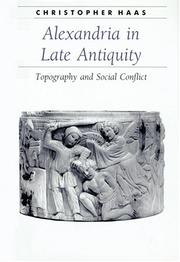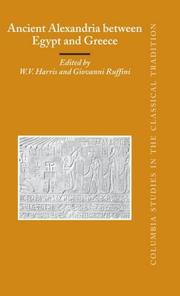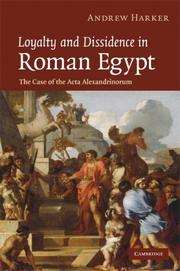| Listing 1 - 10 of 15 | << page >> |
Sort by
|

ISBN: 080187033X 9780801870330 080185377X 9780801885419 0801885418 9780801853777 Year: 1997 Publisher: Baltimore : Baltimore, Md. : Johns Hopkins University Press, Project MUSE,
Abstract | Keywords | Export | Availability | Bookmark
 Loading...
Loading...Choose an application
- Reference Manager
- EndNote
- RefWorks (Direct export to RefWorks)
Alexandria (Egypt) --- Iskandarīyah (Egypt) --- Alexandrie (Egypt) --- Aleksandriyah (Egypt) --- Alessandria (Egypt) --- Alexandreia (Egypt) --- Aleksandria (Egypt) --- Alexantreia (Egypt) --- Alesandriʼa (Egypt) --- الإسكندرية (Egypt) --- الإسكندرية (مصر) --- اسكندرية (Egypt) --- Religion. --- Ethnic relations. --- Social conditions. --- Civilization.
Book
ISBN: 1283362406 9786613362407 161147454X 9781611474541 9781611474534 9781283362405 6613362409 1611474531 Year: 2012 Publisher: Madison, N.J. : Fairleigh Dickinson University Press,
Abstract | Keywords | Export | Availability | Bookmark
 Loading...
Loading...Choose an application
- Reference Manager
- EndNote
- RefWorks (Direct export to RefWorks)
Durrell and the City commemorates the 50th anniversary of the publication of the Quartet with a collection of fourteen new essays by a group of international scholars and critics. The collection provides a critical understanding of all Durrell's urban landscapes, but focuses on the place that made him famous-the city of Alexandria-in order to provide a reassessment of his career and achievement.
Durrell, Lawrence --- Durrell, Lawrence George --- Criticism and interpretation. --- Alexandria (Egypt) --- Iskandarīyah (Egypt) --- Alexandrie (Egypt) --- Aleksandriyah (Egypt) --- Alessandria (Egypt) --- Alexandreia (Egypt) --- Aleksandria (Egypt) --- Alexantreia (Egypt) --- Alesandriʼa (Egypt) --- الإسكندرية (Egypt) --- الإسكندرية (مصر) --- اسكندرية (Egypt) --- In literature.

ISBN: 0374299781 Year: 2000 Publisher: New York (N.Y.): Farrar, Straus and Giroux
Abstract | Keywords | Export | Availability | Bookmark
 Loading...
Loading...Choose an application
- Reference Manager
- EndNote
- RefWorks (Direct export to RefWorks)
Jews --- -Jews, Egyptian --- -Egyptian Jews --- Hebrews --- Israelites --- Jewish people --- Jewry --- Judaic people --- Judaists --- Ethnology --- Religious adherents --- Semites --- Judaism --- Aciman, Andre --- -Travel --- -Alexandria (Egypt) --- -Description and travel --- Jews, Egyptian --- -Aciman, Andre --- Egyptian Jews --- Aciman, André --- Travel --- Alexandria (Egypt) --- Iskandarīyah (Egypt) --- Alexandrie (Egypt) --- Aleksandriyah (Egypt) --- Alessandria (Egypt) --- Alexandreia (Egypt) --- Aleksandria (Egypt) --- Alexantreia (Egypt) --- Alesandriʼa (Egypt) --- الإسكندرية (Egypt) --- الإسكندرية (مصر) --- اسكندرية (Egypt) --- Description and travel.
Book
ISBN: 8779347452 9788779347458 9788779344914 8779344917 Year: 2009 Publisher: Aarhus : Aarhus University Press,
Abstract | Keywords | Export | Availability | Bookmark
 Loading...
Loading...Choose an application
- Reference Manager
- EndNote
- RefWorks (Direct export to RefWorks)
Throughout the entire span of Graeco-Roman antiquity Alexandria represented a meeting place for many ethnic cultures and the city itself was subject to a wide range of local developments, which created and formatted a distinct Alexandrine 'culture' as well as several distinct 'cultures'. Ancient Greek, Roman and Jewish observers communicated or held claim to that particular message. Hence, Arrian, Theocritus, Strabo, and Athenaeus reported their fascination of the Alexandrine melting pot to the wider world and so did Philo, Josephus and Clement. In various fashions, the four papers of Part I of the volume, Alexandria from Greece and Egypt, deal with the relationship between Ptolemaic Alexandria and its Greek past. However, the Egyptian origin and heritage also play important roles for the arguments. The contributions to the second part of the book are devoted to discussions of various aspects of contact and development between Rome, Judaism and Christianity. -- Publisher.
Cultural pluralism --- Learning and scholarship --- Erudition --- Scholarship --- Civilization --- Intellectual life --- Education --- Research --- Scholars --- Cultural diversity --- Diversity, Cultural --- Diversity, Religious --- Ethnic diversity --- Pluralism (Social sciences) --- Pluralism, Cultural --- Religious diversity --- Culture --- Cultural fusion --- Ethnicity --- Multiculturalism --- History --- Alexandria (Egypt) --- Iskandarīyah (Egypt) --- Alexandrie (Egypt) --- Aleksandriyah (Egypt) --- Alessandria (Egypt) --- Alexandreia (Egypt) --- Aleksandria (Egypt) --- Alexantreia (Egypt) --- Alesandriʼa (Egypt) --- الإسكندرية (Egypt) --- الإسكندرية (مصر) --- اسكندرية (Egypt) --- History. --- Intellectual life. --- Religion.
Book
ISBN: 1283550970 9786613863423 9004232370 9789004232372 9789004209480 9004209484 Year: 2012 Publisher: Leiden ; Boston : Brill,
Abstract | Keywords | Export | Availability | Bookmark
 Loading...
Loading...Choose an application
- Reference Manager
- EndNote
- RefWorks (Direct export to RefWorks)
Philo (20BCE?-45CE?) is the most illustrious son of Alexandrian Jewry and the first major scholar to combine a deep Jewish learning with Greek philosophy. His unique allegorical exegesis of the Greek Bible was to have a profound influence on the early fathers of the Church. Philo was, above all, a philosopher, but he was also intensely practical in his defence of the Jewish faith and law in general, and that of Alexandria’s embattled Jewish community in particular. A famous example was his leadership of a perilous mission to plead the community’s cause to Emperor Caligula. This monograph provides a guide to Philo's life, his thought and his action, as well as his continuing influence on theological and philosophical thought.
Judaism and philosophy. --- Hellenism. --- Philosophy and Judaism --- Philosophy --- Philo, --- Alexandria, --- Filon --- Filón, --- Filon, --- Filone, --- Philon, --- Philonis, --- Yedidyah, --- פילון --- פילון מאלכסנדריה --- פילון, --- פילון היהודי --- Филон Александрийский --- Filon Aleksandriĭskiĭ --- Pseudo-Philo --- Alexandria (Egypt) --- Iskandarīyah (Egypt) --- Alexandrie (Egypt) --- Aleksandriyah (Egypt) --- Alessandria (Egypt) --- Alexandreia (Egypt) --- Aleksandria (Egypt) --- Alexantreia (Egypt) --- Alesandriʼa (Egypt) --- الإسكندرية (Egypt) --- الإسكندرية (مصر) --- اسكندرية (Egypt) --- Civilization.
Book
ISBN: 1784918652 1784918660 9781784918668 Year: 2018 Publisher: Oxford : Archaeopress Archaeology,
Abstract | Keywords | Export | Availability | Bookmark
 Loading...
Loading...Choose an application
- Reference Manager
- EndNote
- RefWorks (Direct export to RefWorks)
Excavations (Archaeology) --- Archaeologists --- Alexandria (Egypt) --- Antiquities. --- Historians --- Archaeological digs --- Archaeological excavations --- Digs (Archaeology) --- Excavation sites (Archaeology) --- Ruins --- Sites, Excavation (Archaeology) --- Archaeology --- Iskandarīyah (Egypt) --- Alexandrie (Egypt) --- Aleksandriyah (Egypt) --- Alessandria (Egypt) --- Alexandreia (Egypt) --- Aleksandria (Egypt) --- Alexantreia (Egypt) --- Alesandriʼa (Egypt) --- الإسكندرية (Egypt) --- الإسكندرية (مصر) --- اسكندرية (Egypt)
Book
ISBN: 1282603086 9786612603082 9047441915 9789047441915 9781282603080 9789004138469 9004138463 Year: 2009 Publisher: Leiden ; Boston : Brill,
Abstract | Keywords | Export | Availability | Bookmark
 Loading...
Loading...Choose an application
- Reference Manager
- EndNote
- RefWorks (Direct export to RefWorks)
Scholars have read the Alexandrian riots of 38 CE according to intertwined dichotomies. The Alexandrian Jews fought to keep their citizenship - or to acquire it; they evaded the payment of the poll-tax - or prevented any attempts to impose it on them; they safeguarded their identity against the Greeks - or against the Egyptians. Avoiding that pattern and building on the historical reconstruction of the experience of the Alexandrian Jewish community under the Ptolemies, this work submits that the riots were the legal and political consequence of an imperial adjudication against the Jews. Most of the Jews lost their residence never to recover it again. The Roman emperor, the Roman prefect of Egypt and the Alexandrian citizenry - all shared responsibilities according to their respective and expected roles.
Judenverfolgung. --- Unruhen. --- Jews --- Hebrews --- Israelites --- Jewish people --- Jewry --- Judaic people --- Judaists --- Ethnology --- Religious adherents --- Semites --- Judaism --- Civil rights --- History --- Persecutions --- Alexandria. --- Alexandria (Egypt) --- Iskandarīyah (Egypt) --- Alexandrie (Egypt) --- Aleksandriyah (Egypt) --- Alessandria (Egypt) --- Alexandreia (Egypt) --- Aleksandria (Egypt) --- Alexantreia (Egypt) --- Alesandriʼa (Egypt) --- الإسكندرية (Egypt) --- الإسكندرية (مصر) --- اسكندرية (Egypt) --- Ethnic relations. --- History. --- Politics and government. --- Riots --- Legal status, laws, etc. --- Civil disorders --- Assembly, Right of --- Offenses against public safety --- Political violence --- Crowds --- Demonstrations --- Mobs --- Street fighting (Military science)
Book
ISBN: 9781107008571 1107008573 9780511919992 9781107470644 1107470641 1139152939 110722201X 1139160486 9786613728081 1139157663 1139155911 0511919999 1139159437 1139161482 1280886773 9781139159432 9781139161480 9781139157667 Year: 2012 Publisher: Cambridge ; New York : Cambridge University Press,
Abstract | Keywords | Export | Availability | Bookmark
 Loading...
Loading...Choose an application
- Reference Manager
- EndNote
- RefWorks (Direct export to RefWorks)
Scholarly reception has bequeathed two Callimachuses: the Roman version is a poet of elegant non-heroic poetry (usually erotic elegy), represented by a handful of intertexts with a recurring set of images - slender Muse, instructing divinity, small voice, pure waters; the Greek version emphasizes a learned scholar who includes literary criticism within his poetry, an encomiast of the Ptolemies, a poet of the book whose narratives are often understood as metapoetic. This study aims to situate these Callimachuses within a series of interlocking historical and intellectual contexts in order better to understand how they arose. In this narrative of his poetics and poetic reception four main sources of creative opportunism are identified: Callimachus' reactions to philosophers and literary critics as arbiters of poetic authority, the potential of the text as a venue for performance, awareness of Alexandria as a new place, and finally, his attraction for Roman poets.
Aesthetics, Ancient. --- Esthétique ancienne --- Callimachus --- Criticism and interpretation. --- Appreciation --- Alexandria (Egypt) --- Alexandrie (Egypte) --- Intellectual life. --- Vie intellectuelle --- Esthétique ancienne --- Aesthetics, Ancient --- Callimachus Cyrenaeus --- Callimaco --- Callimaque --- Kallimachus --- Kallimachos --- Kallimachos van Kyrene --- Iskandarīyah (Egypt) --- Alexandrie (Egypt) --- Aleksandriyah (Egypt) --- Alessandria (Egypt) --- Alexandreia (Egypt) --- Aleksandria (Egypt) --- Alexantreia (Egypt) --- Alesandriʼa (Egypt) --- الإسكندرية (Egypt) --- الإسكندرية (مصر) --- اسكندرية (Egypt) --- Arts and Humanities --- History --- Callimaque (0305?-0240? av. J.-C.) --- Critique et interprétation --- Kallimakh --- Kālīmākhūs al-Qūrīnī --- Qūrīnī, Kālīmākhūs --- Calímaco --- Kallimach --- Καλλίμαχος --- Critique et interprétation

ISBN: 9004141057 9789004141056 9789047406389 9786610867189 1429429119 9047406389 1280867183 1433704196 9781429429115 Year: 2004 Volume: 26 Publisher: Leiden ; Boston : Brill,
Abstract | Keywords | Export | Availability | Bookmark
 Loading...
Loading...Choose an application
- Reference Manager
- EndNote
- RefWorks (Direct export to RefWorks)
As one of the greatest cities of antiquity, Alexandria has always been a severe challenge to its historians, all the more so because the surviving evidence, material and textual, is so disparate. New archaeological and literary discoveries and the startling diversity of ancient Alexandria (so reminiscent of some modern cities) add to the interest. The present volume contains the papers given at a conference at Columbia University in 2002 which attempted to lay some of the foundations for a new history of Alexandria by considering, in particular, its position between the traditions and life of Egypt on the one hand, and on the other the immigrants who came there from Greece and elsewhere in the wake of the founder Alexander of Macedon.
Alexandria (Egypt) --- Egypt --- Alexandrie (Egypte) --- Egypte --- History --- Congresses. --- Histoire --- Congrès --- -History --- -Alexandria (Egypt) --- Congrès --- Égypte --- Ägypten --- Egitto --- Egipet --- Egiptos --- Miṣr --- Southern Region (United Arab Republic) --- Egyptian Region (United Arab Republic) --- Iqlīm al-Janūbī (United Arab Republic) --- Egyptian Territory (United Arab Republic) --- Egipat --- Arab Republic of Egypt --- A.R.E. --- ARE (Arab Republic of Egypt) --- Jumhūrīyat Miṣr al-ʻArabīyah --- Mitsrayim --- Egipt --- Ijiptʻŭ --- Misri --- Ancient Egypt --- Gouvernement royal égyptien --- جمهورية مصر العربية --- مِصر --- مَصر --- Maṣr --- Khēmi --- エジプト --- Ejiputo --- Egypti --- Egypten --- מצרים --- United Arab Republic --- Iskandarīyah (Egypt) --- Alexandrie (Egypt) --- Aleksandriyah (Egypt) --- Alessandria (Egypt) --- Alexandreia (Egypt) --- Aleksandria (Egypt) --- Alexantreia (Egypt) --- Alesandriʼa (Egypt) --- الإسكندرية (Egypt) --- الإسكندرية (مصر) --- اسكندرية (Egypt) --- Congresses --- Greco-Roman period, 332 BC-638 AD --- Ptolemaic Egypt.

ISBN: 9780521887892 9780511482793 9780521182584 0511397623 9780511397622 9780511396854 0511396856 0511399219 9780511399213 0511482795 0521887895 1107187214 1281383422 9786611383428 0511396120 0511398379 0521182581 Year: 2008 Publisher: Cambridge, UK ; New York : Cambridge University Press,
Abstract | Keywords | Export | Availability | Bookmark
 Loading...
Loading...Choose an application
- Reference Manager
- EndNote
- RefWorks (Direct export to RefWorks)
The Acta Alexandrinorum are a fascinating collection of texts, dealing with relations between the Alexandrians and the Roman emperors in the first century AD. This was a turbulent time in the life of the capital city of the new province of Egypt, not least because of tensions between the Greek and Jewish sections of the population. Dr Harker's was the first in-depth study of these texts since their first edition half a century ago, and it examines them in the context of other similar contemporary literary forms, both from Roman Egypt and the wider Roman Empire. This study of the Acta Alexandrinorum, which was genuinely popular in Roman Egypt, offers a more complex perspective on provincial mentalities towards imperial Rome than that offered in the mainstream elite literature. It will be of interest to classicists and ancient historians, but also to those interested in Jewish and New Testament studies.
Egypt --- Alexandria (Egypt) --- Rome --- History --- Sources. --- Rim --- Roman Empire --- Roman Republic (510-30 B.C.) --- Romi (Empire) --- Byzantine Empire --- Rome (Italy) --- Égypte --- Ägypten --- Egitto --- Egipet --- Egiptos --- Miṣr --- Southern Region (United Arab Republic) --- Egyptian Region (United Arab Republic) --- Iqlīm al-Janūbī (United Arab Republic) --- Egyptian Territory (United Arab Republic) --- Egipat --- Arab Republic of Egypt --- A.R.E. --- ARE (Arab Republic of Egypt) --- Jumhūrīyat Miṣr al-ʻArabīyah --- Mitsrayim --- Egipt --- Ijiptʻŭ --- Misri --- Ancient Egypt --- Gouvernement royal égyptien --- جمهورية مصر العربية --- مِصر --- مَصر --- Maṣr --- Khēmi --- エジプト --- Ejiputo --- Egypti --- Egypten --- מצרים --- United Arab Republic --- Iskandarīyah (Egypt) --- Alexandrie (Egypt) --- Aleksandriyah (Egypt) --- Alessandria (Egypt) --- Alexandreia (Egypt) --- Aleksandria (Egypt) --- Alexantreia (Egypt) --- Alesandriʼa (Egypt) --- الإسكندرية (Egypt) --- الإسكندرية (مصر) --- اسكندرية (Egypt) --- Arts and Humanities --- Égypte --- Alexandrie (Égypte) --- Acta Alexandrinorum --- 30 av. J.-C.-640 --- Sources --- Antiquité --- 30 av. J.-C.-476 (Empire)
| Listing 1 - 10 of 15 | << page >> |
Sort by
|

 Search
Search Feedback
Feedback About UniCat
About UniCat  Help
Help News
News